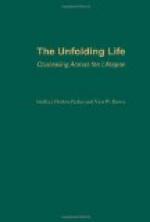(2) Mischief.
(3) Destructiveness.
A word must suffice upon these other manifestations of curiosity. When truly understood, they reveal only an eager mind trying to obtain new experiences to add to knowledge. It is not total depravity that leads a child to pull the articles from the workbasket, or tear the book, or demolish the toy. He merely wants to see the object under as great a variety of conditions as possible, to find out all he can about it. It is identical with the spirit of the scientist who essays new combinations to see what the results may be, only in its inception it is crude and unskilled.
Assuredly, instead of dealing harshly with an instinct which in later years may make the whole world richer, it would be wiser to give it legitimate outlet. Toys and blocks which admit of being taken apart and readjusted may begin the training of an Edison or a Stephenson.
INTERESTS
Just as in the realm of the physical, appetite for one sort of food may be greater than for another, even in hunger, so a varying appetite appears in connection with the soul hunger of curiosity. It is strongest in the direction of that in which the life is naturally interested at any given time.
The interests of early childhood are primarily in things which exhibit or suggest activity and in simplest relationships, found in the little world bounded by home, neighborhood, Kindergarten and Sunday School. Nature makes strong appeal, not on the aesthetic side of tint and shadow, but through the charm of her multiform movements and family life akin to the child’s. The bird’s nest fascinates because there is connected with it the story of the building and the hungry little brood it sheltered. Tales of animals, fairies and real folk, busy in simple and familiar occupations hold him entranced, and he will watch with rapt attention the performance of most common tasks. It is noteworthy that his interest in all this is not so much in the end to be accomplished, as in the activity itself. Even in his play, the preparations are often more delightful and satisfying than the game which follows.
All this has a deep meaning for one who is trying to help the little life in its unfolding.
1. “Wise education takes the tide at the flood,” says James. These interests reveal the fact that in this period, instruction should deal with things, not with statements of ideas, apart from things, or, in other words, with the concrete, not the abstract.
2. The greater the knowledge of things gained while interest attaches to them, the greater the resources for clear, broad thinking as life matures.
3. When instruction is in line with interests, attention and consequent learning are assured.
4. The child’s religious interests will be identical in character with the other interests of this period. He will not be interested in the Being or attributes of God, but God in His great activities as Creator and Wonder-Worker, and in His relation as Father. Jesus will make appeal, not in His discourses, but in His acts of helpfulness and power, and His love.




